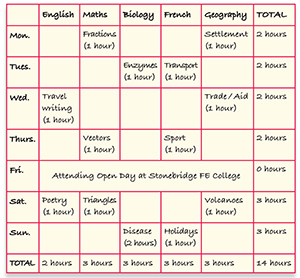 Some pupils are brilliantly organised, needing little help; others…not! Many need guidance in planning ahead, especially when “ahead” is months away. Looking into the future and working out how you’ll feel and how much time you need for a task involve complex mental processes and teenagers are only just learning these skills; the thought of so many exams can seem too daunting or too far away for planning even to be possible, let alone manageable.
Some pupils are brilliantly organised, needing little help; others…not! Many need guidance in planning ahead, especially when “ahead” is months away. Looking into the future and working out how you’ll feel and how much time you need for a task involve complex mental processes and teenagers are only just learning these skills; the thought of so many exams can seem too daunting or too far away for planning even to be possible, let alone manageable.
Also, everyone has different lives and challenges. Some pupils have extra-curricular activities to manage – carrying on with hobbies and sport is really important for mental health – and others have difficult family lives.
Getting each pupil to create their personal revision time-table is a great class activity and can throw up various discussion points regarding things like nutrition, sleep, relaxation, and asking for help. Ideally, you would do this about three months before exams, and revisit it a month before to see what needs to be adjusted.
I’ve created a thirty day revision time-table template which you can download here. You’ll find lots of tips for pupils and things to think about. Of course, you may well already have your own tried and tested method or a template your school uses but seeing a different method can throw up new factors to consider.
Class activity
Pupils make their personal revision time-table, following these guidelines. They can be as artistic as they wish! Working in groups and sharing ideas is helpful.
Make a chart with a space for each day from now until the last exam. You might want to design more space for the last thirty days, as you’ll want more detail there.
- Enter the dates of each exam and indicate if morning or afternoon.
- Fill in any dates when you won’t be able to revise, for example because of a competition, medical appointment or trip.
- Think about what subjects take more revision and how long each needs. (Discuss the virtues of doing something manageable first, but not leaving the most daunting subjects till last.) Then, in pencil, block off sections of time per subject, finishing about a month before the first exam. This means that the last month is for proper revision – ie reducing notes and learning/practising.
- In that last month, make sure you build in time off. (I’ll talk about daily relaxation in another post.) Remember that you might lose time through illness, so you need to include some slack.
- Look at items in my 30 day chart attached and note them in your own time-table. Sleep, nutrition, exercise, stress and breathing/anti-panic strategies are all really important aspects of exam preparation and I cover them all in more detail in other posts.
The main message is: yes, exams are challenging and stressful, but we can make them much less so by preparing well, as far in advance as necessary. I liken it to athletes preparing for a major competition: they won’t leave it to the last minute but will plan ahead, including nutrition, sleep, relaxation and mental health. Their coach’s job is to help them make and follow the plan. And in this case, you are the coach!
Copyright © Nicola Morgan 2104
Nicola Morgan is an award-winning writer for teenagers and the author of Blame My Brain and The Teenage Guide to Stress. She offers training on aspects of adolescence and has created Brain Sticks™, teaching resources about the brain and mental health. Nicola is proud to be a co-author of Collins GCSE Study Skills publishing September 2015.



